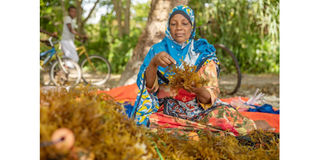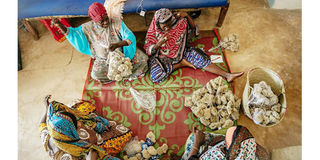Prime
Rising ocean temperatures challenge women seaweed farmers in Zanzibar

Seaweed farmers in Zanzibar. PHOTO | COURTESY
What you need to know:
- While seaweed farming has been a major economic activity for thousands of women for years, the rise in seawater temperature has begun to challenge their daily lives
By Emilie Authier
Around the world, women are the primary victims of climate change’s consequences.
Strolling along the coasts of Zanzibar in Jambiani, the carefree attitude of tourists marvelling at the turquoise water might almost make one forget that.
While seaweed farming has been a major economic activity for thousands of women for years, the rise in seawater temperature has begun to challenge their daily lives.
Resilience and adaptability have thus become key terms for these coastal women, whose fate is intrinsically linked to the climate.
A significant portion of Zanzibar’s GDP is associated with activities that are directly or indirectly sensitive to the climate.
Women living near the coast play a major role in the island's economy, notably through seaweed and sponge farming.
To date, this farming has even become the island’s third-largest source of income.
Of nearly 25,000 seaweed farmers, about 90 percent are women.
Beyond being a key sector for Zanzibar, this activity is crucial for empowering these women, enabling them to achieve financial and social independence.

However, rising ocean temperatures, increased wind intensity, and irregular precipitation disrupt seaweed farming yields.
Between 2002 and 2021, seaweed production has decreased by 47 percent, threatening jobs and, consequently, the financial and physical security of these women.
“Their roles as main producers of seaweed expose them directly to environmental changes, affecting their livelihoods and economic stability,” confirms the executive director of the Aqua-Farms Organisation (AFO), Mr Jerry Geofrey Mang’ena.
“For many years, seaweed farmers didn’t have enough support, and the solutions were not robust enough to address the challenges holistically; they were not successful,” said the project manager of Marine Cultures, Mr Ali Mahmudi Ali.
But in recent years, the government of Zanzibar, under the aegis of the Ministry of Blue Economy and Fisheries, has played a pivotal role in revolutionising seaweed farming.
The Zanzibar government’s current initiatives have enabled increased support and investment in the seaweed industry, including the establishment of a processing facility in Pemba with an annual capacity of 30,000 tonnes.
Additionally, as part of the Covid-19 relief efforts, the government is providing boats and equipment to assist seaweed farmers.
“The national focus and frameworks are currently in support of blue and sustainable investments for improving livelihoods and wellbeing of the coastal dwellers, the economy, and the ecosystems,” explains Mr Mang’ena.
Thanks to government measures, around 5,000 people have directly benefited from the increase in selling prices and the equipment needed to cultivate seaweed in deeper waters.
This economic improvement is particularly significant for women, who make up the majority of the seaweed farming community in Zanzibar.
In 2023, the first Blue Economy Gender Strategy and Action Plan by the Ministry of Blue Economy and Fisheries in Zanzibar was launched.
The strategy addresses key issues, particularly women's limited access to resources, finance, and markets, while the Action Plan outlines concrete steps to bridge this gap by supporting women engaged in the blue economy.
The government’s effectiveness in supporting coastal women is also made possible by the work of organisations that directly assist seaweed farmers on the ground.
For instance, AFO aims to support the most vulnerable community groups, particularly youth and women along the coast, “who are often left to deal with environmental shocks and are severely affected by climate change,” explains Mr Mang’ena.
AFO has even created a special branch focused on their empowerment to promote gender equality and social inclusion.
“By providing loans for boats and equipment and offering training in financial management and skills, we help these groups break barriers of access and increase their yield, achieving greater economic stability," explained AFO.
Empowering those women not only leads to sustainable and inclusive development but also improves the management of natural aquatic resources and overall community well-being.
Zanzibar’s journey in seaweed production is an economic success story, thanks to its approach of the blue economy.
Unfortunately, there is no miracle solution to stop climate change.
While Mr Mang’ena emphasises that there are many initiatives addressing environmental and gender issues.
He insists on the potential for improvement in this area.
For him, the lack of follow-up after capacity building, the insufficient funding for community projects, and delays in policy implementation contribute to stalling sustained progress and effectiveness in addressing women's specific needs in climate resilience efforts.
In his opinion, to enhance cooperation, stakeholders should focus on sustained engagement and initiative monitoring, promote gender-sensitive policies, and strengthen collaboration to effectively utilise collective expertise and resources.
Other actors, on the other hand, have chosen to shift towards a more climate-resilient cultivation: sea sponge farming.
In about fifteen years, sea sponge farming has become a profitable activity for many women who have been forced to redirect their work.
An organisation has been particularly concerned with this issue: Marine Cultures, a non-profit association founded in Switzerland and started in Jambiani in 2009.
Mr Ali explains that when this NGO was created, the seaweed farming started to decrease.
“We thought about what we could do to improve the situation and propose alternatives to communities,” said Mr Ali Marine Cultures mainly supports the recruitment of divorced mothers with children, who are often in precarious situations.
The organisation provides initial training to these women to give them the tools they need for empowerment in this culture.
To date, eleven women are working, most of whom previously worked in seaweed farming.
By interviewing them, Hindu Simai Rajab, a sponge farmer, explains the differences she has perceived between the two types of cultivation.
“The seaweed farming was really less secure and stable compared to sponge farming, because with the weather sometimes we had nothing,” she said.
Another sponge farmer, Salama Ali Mtuweni, also talks about the consequences of climate change on seaweed farms.
“In the seaweed farming, with the increase in temperature, some seaweed is rotten, so the incomes got more and more low. This is why I had to quit seaweed farming,” she says.
However, even though this type of culture is more resilient to climate change, it is not without threats.
“In 2020, we lost nearly 90 percent of the sponges at the farms. We didn’t know what the reasons were at that time, so we had to find out thanks to sponge specialists,” said Mr Ali.
“Some challenges that I’m facing are that the losses of sponges in some seasons,” added Salama.
However, to date, thanks to close collaboration with scientists, sea sponge farming in Jambiani appears to be less sensitive to climate variations, providing the resilient women working in it with economic stability.
“Sponge farming gave me a better economic status; I didn’t expect that one day I would be able to own a house, but now I do thanks to it. I’m proud of my job because I became more independent, and I decide whatever I like. I’m able to educate my children,” said Hindu.
“Now I really see the difference between as I was before and as I’m right now. The incomes from sponge farming are higher than those from seaweed farming. It changed my life to work here,” declared Salama.




